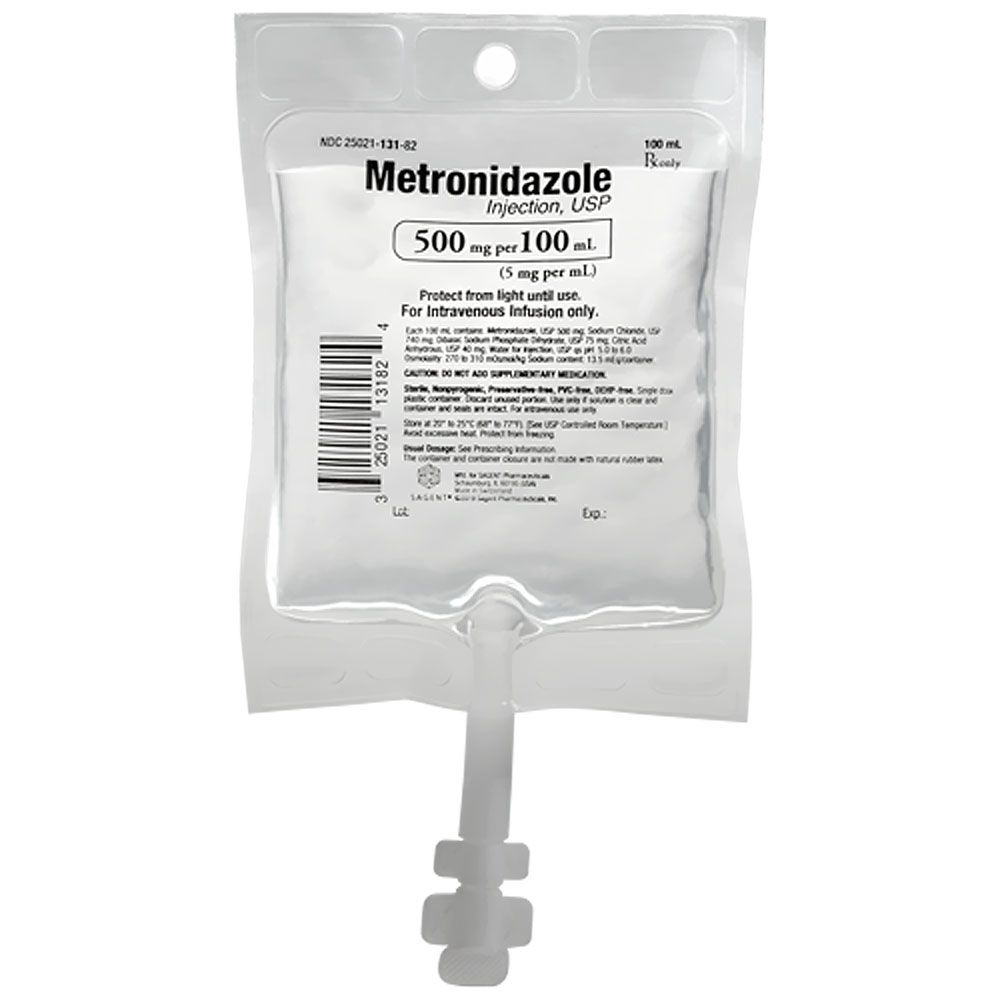SAVE 20% OFF 20% OFF Use Code PREZ20 *

Metronidazole for Dogs & Cats - USP Injection, 500-mg, 100-mL - [Anti-Diarrheal Medication]
- Description
- Directions
- Reviews
Description
Metronidazole Injection USP is commonly used as an anti-diarrheal medication that treat inflammation of the large intestine. It is also effective against certain protozoal and bacterial infections such as Giardia, Trichomonas and Balantidium coli. It is effective against only anaerobic pathogens, but is safe to use in conjunction with many other antibiotics for mixed infections.
Metronidazole is able to treat central nervous system infections that most other drugs cannot treat by penetrating the blood-brain barrier. It is also particularly effective against infections of the bone and teeth.
Key Benefits
- Treats a wide array of ailments
- An antibiotic that effectively treats inflammatory bowel disease
- Remedies certain diarrheal disorders
- Treats infections caused by Giardia (intestinal parasite)
- Also treats periodontal disease
How It Works
Metronidazole is especially effective against anaerobic infections - bacteria that can live without oxygen. It's able to penetrate bone, making it especially useful in oral/dental infections. In addition, it has anti-inflammatory properties in the large intestine and is an effective anti-diarrhea medication for certain diseases.
Indications
Metronidazole for dogs and cats is an effective antimicrobial drug, efficient in the treatment of giardia infections, inflammatory bowel diseases and infections in the mouth. Metronidazole for dogs and catsin combination with other drugs can treat even the most severe infections. Various protozoal infections in cats and dogs can be treated effectively with the help of this medication. It works by disrupting the DNA and thus killing the bacterial microorganisms.
Directions
Use this medication as directed by your veterinarian.
- Metronidazole is a prescription antibiotic used in dogs and cats to treat various conditions such as inflammatory bowel disease, nonspecific diarrhea disorders, infections caused by Giardia, and periodontal disease.
- Metronidazole is not FDA-approved for use in veterinary medicine; however, it is a commonly accepted practice for veterinarians to prescribe this medication for dogs and cats.
- The actual dose and duration of treatment with metronidazole depends on the specific condition being treated.
Tip: Metronidazole should be given to your pet for the entire length of time prescribed by your veterinarian. Do not give in larger amounts or use it for longer than recommended by your veterinarian.
Cautions:
Antibiotic medications can cause diarrhea, which may be the sign of a new infection. If your pet has diarrhea that is watery or has blood in it, contact your veterinarian. Do not use any medication to stop the diarrhea unless instructed by your veterinarian.
Precautions:
Before administering Metronidazole for dogs and cats, test the animal for hypersensitivity towards the contents of the drug. Abstain from using this medication on pregnant and breeding pets as well as puppies and kittens. It might be slightly difficult to administer the medication as it has a strong bitter taste. Prolonged as well as over dosage of this medication can bring about many harmful effects. Administer Metronidazole in reduced doses on animals with underlying liver disease or blood disorders. If the pet is under phenytoin or other anticoagulants medication such as warfarin, avoid using Metronidazole, as adverse reactions are likely to occur.
Side Effects:
A few of the commonly noted side effects of Metronidazole for dogs and cats are neurologastro-intestinal disorder, lethargy, weakness, neutropenias, hepatoxicity, and hematuria. Cases of anorexia, nausea, excessive salivation, gagging, regurgitation and diarrhea are also reported. Harmful effects of metronidazole for dogs and catsnormally affect the brain and its equilibrium. Drowsiness, rashes and incoordination are other side effects. There are a few rare side effects such as loss of appetite, vomiting, staggering or difficulty in walking, involuntary and constant eye movements, lethargy and seizures. Occasionally death can also occur and therefore stop administration of the drug as soon as any side effects are noted.


